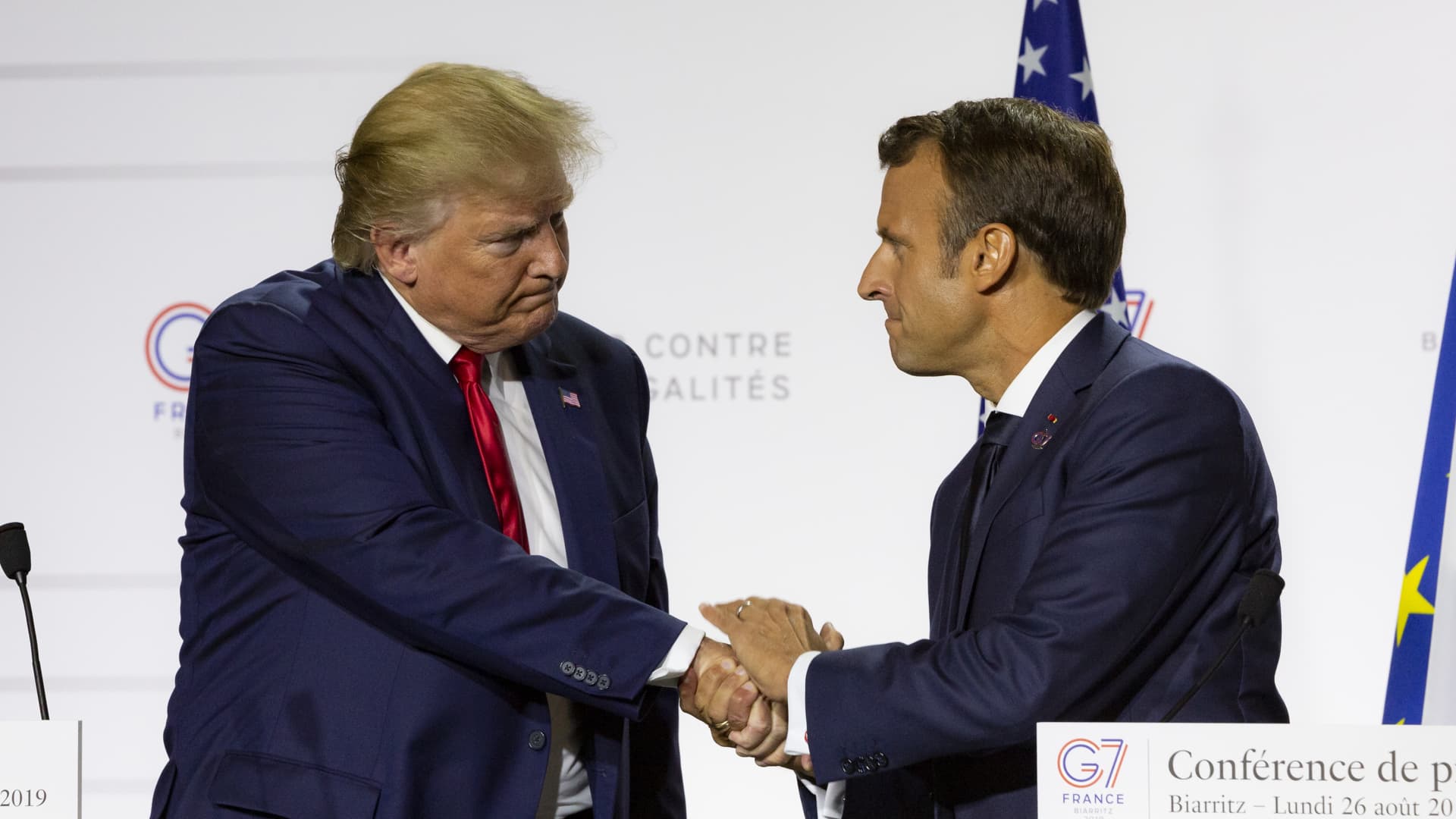Donald Trump (L), President of the USA, and Emmanuel Macron, President of France, join hands during the final press conference of the G7 Summit on 26 August 2019, in Biarritz, France.
NurPhoto | NurPhoto | Getty Images
European officials have been quick to congratulate Donald Trump after he defeated his Democratic rival Kamala Harris to return to the White House, despite a stark realization that renewed economic warfare could be just around the corner.
European diplomats and their respective leaders have been preparing for the eventuality of a Trump victory for more than 12 months, placing a growing focus on policies that could protect the European economy from potential trade disputes.
Some European officials woke up to election results on Wednesday “not wanting to believe” them, several sources told CNBC.
“I am seeing it, [and] not wanting to believe,” said one EU official, who did not want to be named due to the sensitive nature of the transatlantic relationship. “But I am not as shocked as last time.”
Many European leaders did not enjoy Trump’s style of confrontational leadership during his first presidency, and there were several moments of tension with the former White House leader. As a result, many in Brussels celebrated the victory of Joe Biden in 2020, hoping for a better engagement.

A second EU source, who also did not want to be named because of the sensitivity of the relationship, said: “It is not great, again.”
But the source echoed the feelings of the previous official, acknowledging, “At least, I am not as surprised [as in 2016].”
EU leaders to meet Thursday
European Commission President Ursula von der Leyen, French President Emmanuel Macron, Spanish Prime Minister Pedro Sanchez, Italian Prime Minister Giorgia Meloni and Hungarian Prime Minister Viktor Orban were among the first EU leaders to offer their congratulations to Trump on Wednesday morning.
Concerns regarding Trump are not wholly shared across the European continent. Hungary’s Prime Minister Viktor Orban, who has in the past spoken of his admiration for Trump, has previously reportedly said that he would open a bottle of champagne if Trump were elected.
EU leaders are scheduled to meet for a regular meeting Thursday and Friday in the Hungarian capital of Budapest, which will provide them with an opportunity to discuss their future plans for the transatlantic relationship.
Trump has threatened to impose an additional 10% in tariffs on European nations, while also saying that the European Union would have to “pay a big price” for not buying enough American goods.

Trade with the United States is critical for European nations. The EU and the U.S. have the largest bilateral trade and investment relationship in the world, which reached an all-time high of 1.2 trillion euros ($1.29 trillion) in 2021, according to data from the European Commission, the executive arm of the EU.
Any additional tariffs could further pressure the already moribund economic growth levels across the EU.
“There will be a first discussion [on the outcome of the U.S. election] in Budapest,” a third anonymous EU source told CNBC Wednesday morning, regarding the meeting of the European Political Community (EPC) which will start Nov. 7.
“We will see what sort of rhetoric [Trump] will have, but if it is not very different, the main challenge will be Ukraine,” the third diplomat said. “Our big focus is to keep the European unity,” the same diplomat said.
‘Worst economic nightmare’
In a research note on Wednesday morning, ING analysts said that Europe’s “worst economic nightmare” has come true with the election of Trump.
“A looming new trade war could push the euro zone economy from sluggish growth into a full-blown recession. The already struggling German economy, which heavily relies on trade with the U.S., would be particularly hard hit by tariffs on European automotives,” said the team of analysts, led by James Knightley.
“Despite European politicians’ claims of being prepared for a second Trump presidency, it remains unclear whether Trump could indeed prompt deeper integration, given the domestic challenges many European governments face. Europe will likely wait to see what policies Trump actually implements.”
Speaking at the IMF annual meetings in Washington, D.C., last month, German Finance Minister Christian Lindner warned there could be retaliation if the U.S. kicked off a trade war with the European Union.
“We need diplomatic efforts to convince whoever enters the White House that it’s not in the best interest of the U.S. to have a trade conflict with [the] European Union,” he said, adding, “We would have to consider retaliation.”

